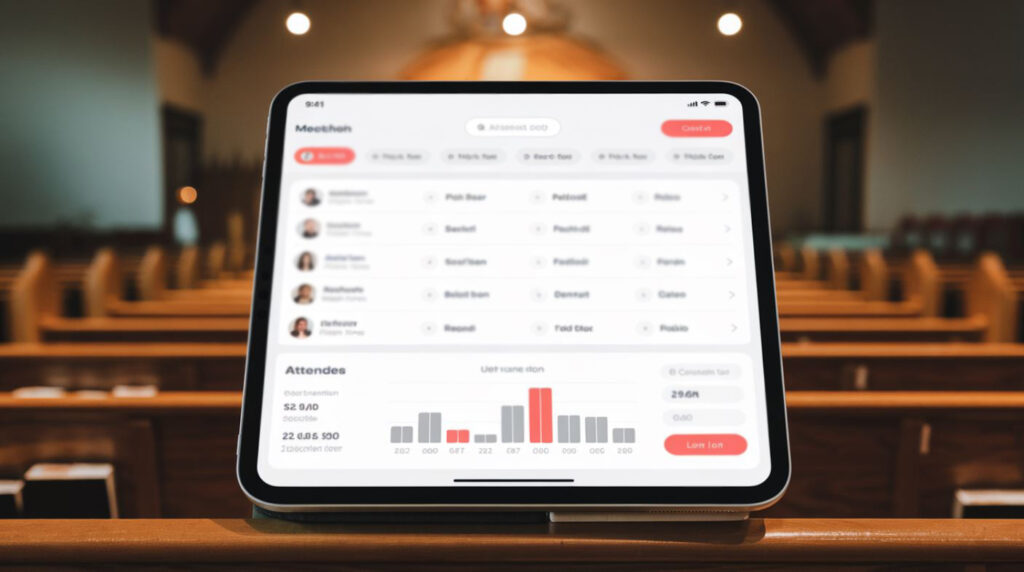In the era of technology usage in churches, it is growing to improve efficiency and provide an experience for church members. This is especially true in attendance tracking, where free check-in apps are becoming popular for easier attendance management. This piece delves into the different app choices with their respective features and advantages to help determine the best fit for any congregation.
Importance of Attendance Tracking
The first feature that your paid or free church check-in app should provide is attendance tracking. Keeping track of attendance serves essential purposes for churches, as it allows them to gauge the involvement of their members accurately and plan activities accordingly based on attendance trends. Moreover, monitoring attendance aids in maintaining records to foster community bonds and identify those requiring extra assistance or outreach support.
Features to Consider
When picking out a church check-in application for your needs, make sure to consider features that are important in making your decision. There are many factors to consider, such as ease of use, integration capabilities, customizable features, etc.
Let’s take a detailed look at some church check-in app features for efficient attendance tracking.
User-Friendly Interface
Many churches opt for an app that has a user-friendly interface to streamline their processes effectively and efficiently for all users’ convenience and comfort levels. These apps prioritize simplicity to cater to individuals with varying skills and knowledge levels by incorporating features like QR code scanning capabilities and self-check-in functionalities alongside real-time notifications. By offering navigation options and intuitive design elements in these apps, volunteers can efficiently support attendees during check-in procedures to ensure a hassle-free experience.
Integration Capabilities
For individuals looking for operations and efficiency in their work processes, applications with integration features are particularly noteworthy. These software solutions seamlessly link up with church management systems, ensuring that data is synchronized across platforms. This integrated approach helps reduce errors from data entry and saves time. Moreover, certain applications provide API access, granting churches the flexibility to develop customized integrations that cater to their requirements.
Customizable Features
Some churches may be interested in using apps to tailor their check-in procedures for a personalized touch. These apps offer flexibility for users to make adjustments, such as adding custom fields or creating check-in screens. They can also receive alerts tailored to attendance patterns. Customizing the app helps ensure it reflects the church’s mission and operational objectives accurately.
Advanced Reporting Tools
Making decisions based on data is easier now, thanks to applications that offer reporting features. These tools provide in-depth analysis to help churches understand attendance patterns and member involvement better. The reports may contain information about demographics, frequency of attendance, and participation in events. With this data at their disposal, church leaders can make informed choices to support the growth of their community.
Mobile Compatibility
Nowadays, almost everyone owns a smartphone, so having mobile apps has become very important. These apps make it easy for users to log in using their phones, offering added convenience. Mobile applications often send notifications to keep users updated about events or any schedule changes. This function is especially beneficial for engaging with technology community members.
Security and Privacy
Keeping member data safe is a concern for all organizations. Their focus is on using apps that place importance on security and privacy aspects to offer reassurance. Seek options that ensure data is transmitted in an encrypted manner, secure login procedures are in place, and regulations on data protection are adhered to. By implementing strong security protocols, churches can establish confidence among their members.
Conclusion
Choosing the right church check-in application depends on effectively grasping the unique requirements and preferences of a congregation. Different options are available to meet varied needs, such as user-friendliness, integration capabilities, customization features, report generation abilities, device suitability, and security measures. By embracing advancements, churches can improve interaction, simplify tasks, and cultivate a community. These digital tools will remain crucial in aiding church expansion and fostering member relationships as technology progresses.

